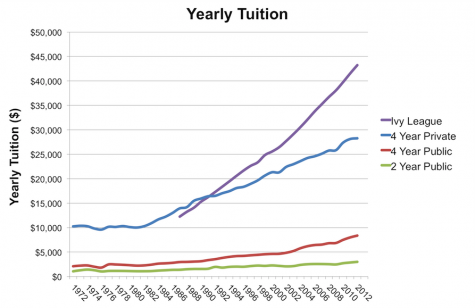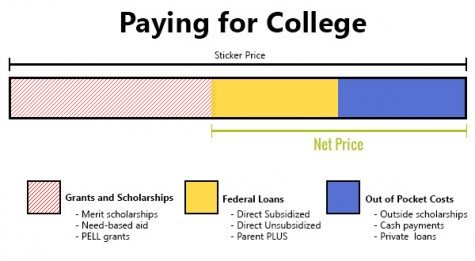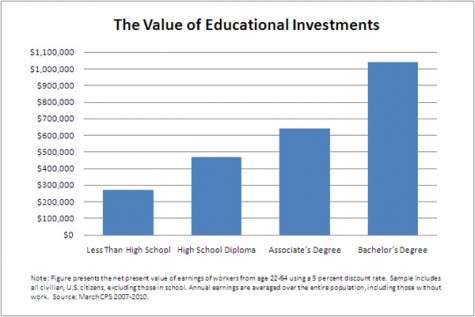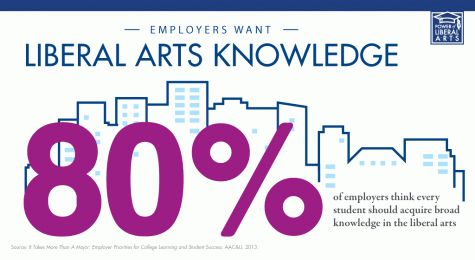The Cost of College
November 24, 2015
The month of November is a crucial point in a high school senior’s year. College application deadlines are rapidly approaching, if they have not already passed from early action or early decision applications. A looming question continues to progress into every anxious applicant’s mind: Is college really worth its cost?
The term “worth” is subjective, however I will attempt to clear up the ambiguities.
Background
When operationally defining cost as a matter related to money, the average sticker price for an in-state public college (E.g. Rutgers University) is $24,061 and a private college (E.g. Princeton University) is $47,831 for the upcoming 2015-16 school year. These costs are divided into factors such as tuition, books/school supplies and personal expenses, such as transportation, phone bills, and having a social life.
How to pay for College
A prospective student should NOT let the sticker price overwhelm and scare them into not considering college after graduating high school. A number of ways exist to fund a college education. Students are able to file for the FAFSA (Free Application for Federal Student Aid), which grants need-based federal grants and scholarships to students who qualify; those who do not qualify are eligible for unsubsidized loans which are paid after the student graduates from college. In addition to loans, schools and communities grant scholarships to applicants, which do not require reimbursement. Because of these factors, the actual price of college is usually lower than its sticker price.
College Pays for Itself
In a video regarding the same topic, author John Green provides empirical data on the monetary cost of college. He notes that college graduates would only need to make one dollar and 75 cents more than they would without going to school (i.e. $12/hr instead of $11.25/hr) for college to literally pay for itself. Going to college makes dollars and makes sense.
More than Money
As stated in my previous editorial on the SAT, two-dimensional numbers like standardized test scores, or in this case the cost to get in or post-graduate salary, do not reflect the quality of a person. Going to college provides deeper rewards than money.
Wesleyan University President, Michael Roth, believes that “A successful liberal arts education develops the capacity for innovation and for judgement… and it is no surprise that their graduates can be found disproportionately in leadership positions in politics, culture and the economy.” College students, specifically the ones who pursue liberal arts majors are exposed to a wide range of topics that help build them into people that are highly adaptive and are more apt to feel comfortable in the ever-changing job market. Careers are dependent on current culture, societal and economical beliefs, and college grads are able to readjust according to the status quo.
The Argument Against College
The counter-argument to the cost of college lies in the importance of trade jobs. Trade classes in high school have essentially ceased to exist as secondary education aims to prepare students to work in jobs requiring post-secondary education. People believe that trade classes should be reinstated because not everyone has the drive or plan to go to college after they graduate. The flaw in this thinking originates from the misconstrued purpose of education. School teaches students how to learn, rather than specific skills. Students may question why conceptual ideas as the Pythagorean Theorem and The Ideal Gas Law are taught and practical abilities like filing taxes are not. A student that is able to comprehend a complex idea like the Pythagorean Theorem is believed to have the ability to research how to file taxes and successfully file them with no need for extraneous active instruction. Furthermore, students who have went through a high school education do not need trade classes in high school, since they can learn by using their fine-tuned minds after graduation.
Conclusion
It is true that college is not for everyone. Some people may not have aspirations to go to college after high school and, therefore, may enlist in the military or join the workforce, which is a sound and viable alternative to school. The students that do have intentions of attending college should not question the worth of it and scare themselves out of pursuing a post-secondary education. College is literally worth its cost when speaking about money and worth the invaluable perspicacity gained from a college education. Society progresses as a whole when more students go to college because graduates emerge as innovative thinkers and leaders that bring positive change to our world.
SOURCES (For further reading)
- http://www.collegedata.com/cs/content/content_payarticle_tmpl.jhtml?articleId=10064
- http://www.huffingtonpost.com/michael-roth/whats-a-liberal-arts-educ_b_147584.html
- https://www.youtube.com/watch?v=t_N7MAr98CI



